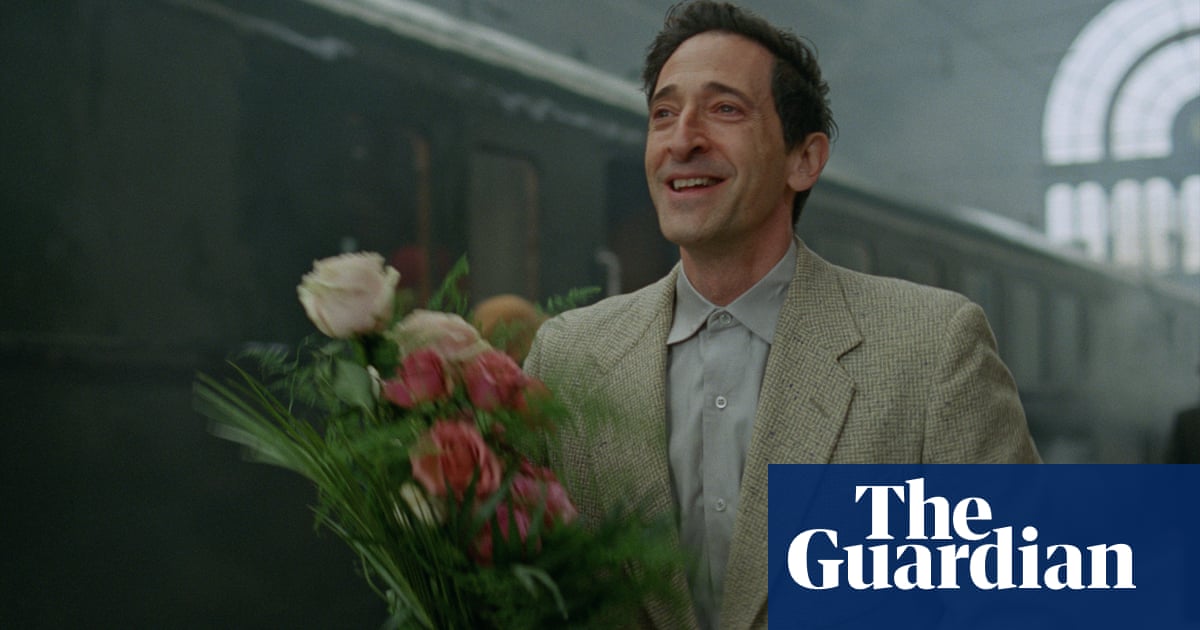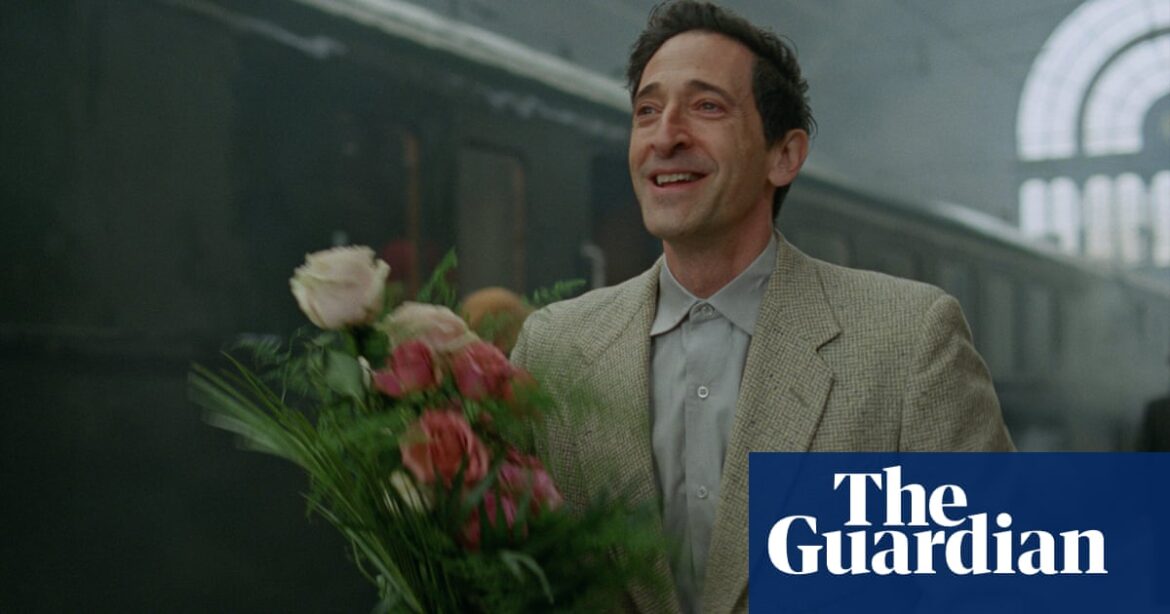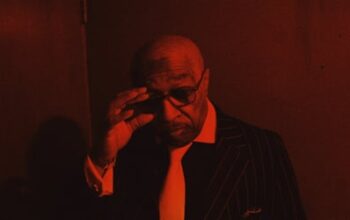
Ahead of the 2 March Oscars ceremony, the Guardian film looks at how the big contenders are shaping up in the race for glory. We sort through the nominees for the best actor Oscar, assessing each one’s chances and how you can watch or stream each film.
Adrien Brody for The Brutalist
Career wins and nominations: Brody became the youngest ever winner of the Oscar for leading actor in 2003, when he took the prize for his role in Roman Polanski’s The Pianist, aged 29 years, 343 days. This is his second Oscar nomination; now 51, Brody has a pretty clean sweep of Oscar run-up awards, including the Golden Globe for actor in a drama, the Critics Choice award and the Bafta.
Who he plays: László Tóth, a fictional (though barely) Hungarian modernist architect who survives the second world war, via its concentration camps, and ends up in the US. There, he’s commissioned by moneybags tycoon Harrison Van Buren (Guy Pearce) to design and build a huge community centre, with a chapel and swimming pool, in memory of his late mother. The film charts Tóth’s career, his combative relationship with his mentor, and his marriage to wife Erzsébet (Felicity Jones).
How’s he doing in the Oscars race: The Oscar is Brody’s to lose. Competition had been perceived to be tighter earlier in the season, with Timothée Chalamet and Ralph Fiennes seeming plausible rivals. But Brody now appears to have gathered unstoppable momentum.
What the Guardian review said: “Tóth is played with angular fierceness and passion by Adrien Brody: a career best for him, surely, and an advance on his performance in Roman Polanski’s The Pianist.”
Why he should win best actor: This is acting with a capital A – and the rest of the word hollered out too. Few could begrudge Brody the prize for such an all-in performance of chewy and magnetic intensity. He anchors a film whose scope requires a monumental performance to do so.
Brody is perceived as an actor of immense and serious commitment to his craft – which the Oscars enjoy rewarding. Press for the film has focused on how his own roots and journey mirror that of his character; no one could accuse him of not being the right man for the role. His tendency towards preciousness has not tipped over into parody, and earnestness is an attribute embraced in LA.
Brody’s podium speeches so far have been well judged, flagging the film’s importance as the intellectually rigorous story of an immigrant in the US, as well as liberally thanking his parents, and his partner, Georgina Chapman. Chapman is the ex-wife of Harvey Weinstein, and Brody has paid tribute to her resilience. Still reeling from the horror of his reign, Hollywood is ever-eager to atone for its sins in allowing his behaviour to run unchecked.
Why he may not win: The Brutalist is widely admired, but it is not as passionately adored as some of the other films in contention. Boomers, for instance, who account for a fair number of Oscar voters, may opt instead for Chalamet’s pitch-perfect impression of their hero Bob Dylan.
In January, a minor row broke out when it emerged that AI had been used to help smooth the Hungarian accents of Brody and Jones. The director, Brady Corbet, was quick to dampen down the backlash, saying the performances were “entirely their own”, but such is Hollywood’s fear of AI, some damage will have been done.
Brody might be polished at awards ceremonies these days, but his surprising snog of Halle Berry at the Oscars 22 years ago cast a memeworthy pall over his finest hour. Questions about this moment have been met with no comment, as have those over his current feelings towards Polanski. With considerable backstage sweat, any major controversies seem to have been swerved.
Further reading: ‘People often don’t feel treated as equals’: Danny Leigh speaks to Adrien Brody about complexity, comebacks and The Brutalist
How to watch Adrien Brody in The Brutalist
Austalia: in cinemas
UK: in cinemas
US: in cinemas
Timothée Chalamet for A Complete Unknown
Career wins and nominations: This is Chalamet’s second Oscar nomination – in 2018 he became the third youngest ever leading actor nominee, after Brody for The Pianist and Mickey Rooney for Babes in Arms (1939), for his role in Luca Guadingno’s Call Me By Your Name. If he wins the Oscar, he’d beat Brody’s 2003 record and become the category’s youngest ever winner, by 268 days.
Who he plays: Chalamet plays Bob Dylan in James Mangold’s film about the start of the singer-songwriter’s career, from his arrival in New York to his music-changing amp moment at the 1965 Newport folk festival.
How he’s doing in the Oscars race: The distributor Searchlight brought forward the release of the film – which only finished shooting last summer – to last Christmas in the US in order for it to qualify for an awards run. Such confidence appeared to have been well placed: early reactions to the film, and Chalamet’s performance in particular, were ecstatic. These were echoed by the critics – and audiences, too, who have warmly embraced the movie. Even the most nit-picking Dylan academics have largely professed amazement at Chalamet’s turn.
Yet while nominations from every awards body have been forthcoming, wins have not. So far Chalamet is yet to bag a major prize. Or, in fact, any prize. What appeared to be a very good bet now has major diminishing returns.
What the Guardian review said: “Chalamet is a hypnotic Dylan, performing the tracks himself and fabricating to a really impressive degree that stoner-hungover birdsong. He does a very passable version of Don’t Think Twice, with the distinctive, eccentric intonations, singing as if he’s not entirely sure of the tune and appearing to run out of breath at the end of every line.
Chalamet is also good at Dylan’s insolent comedy in art as in life: puckish, witty, insufferable and yet wounded, someone whose habit of wearing dark glasses indoors gets him beaten up.”
Why he may win: A late surge of love has been tracked for Mangold’s film, with Variety recently tipping it to take best picture. Chalamet snatching the actor prize would count as a major upset, yet – as mentioned earlier – the Academy voters still skew considerably white, male and old, which means endorsing someone who inhabits their hero is still a potential.
Chalamet went pretty method in the making of the film, including keeping the accent going while off camera, refusing visitors and insisting he even be listed as “Bob Dylan” on the call sheet, which is all catnip for the Academy. He learned harmonica as well as guitar, another indicator of real commitment, as well as a genuflection to a generation the Oscars like to deify. Mangold has form here, too: Reese Witherspoon won the best actress Oscar for playing June Carter Cash in his biopic Walk the Line (with star Joaquin Phoenix making do with a nomination).
It’s also worth remembering that Chalamet has another film on the best picture list – Dune: Part Two, which has so far earned more than $715m (£567) box office worldwide (about seven times A Complete Unknown’s total). After a bumpy box office year, Hollywood may be eager to thank a young actor who has saved a fair few jobs by his ability to draw audiences back to cinemas (see also Wonka).
The Academy is also keen to woo younger viewers to their telecast: celebrating Chalamet is a very easy route to doing so.
Why he may not win: Although he played it serious on set, Chalamet’s press tour has been marked by larkiness – lots of grinning and Instagram, batty red carpet outfits, cuddling with Kylie Jenner and slightly dubious Lime bike claims. This strategy may delight gen Z fans, but the Academy tends to like art to be elevated above all else.
Chalamet’s youth – and track record with nominations – may also count against him. Voters will figure there will be a next time, and they can reward him then.
Further reading: ‘It’s full of things that didn’t happen – but it feels right!’ Inside the making of Bob Dylan film A Complete Unknown
How to watch Timothée Chalamet in A Complete Unknown
Australia: in cinemas
UK: in cinemas
US: in cinemas
Ralph Fiennes for Conclave
Career wins and nominations: This is Fiennes’s third Oscar nomination and would be his first win. It would also be his first major acting prize since the 1993 supporting actor Bafta for Schindler’s List. That means that he hasn’t won anything for films such as – and this is not an exhaustive list – The English Patient, The End of the Affair, The Constant Gardener, The Grand Budapest Hotel, The Invisible Woman, The Menu, A Bigger Splash, Spider, Sunshine, Red Dragon – and Harry Potter(s).
Who he plays: Cardinal Lawrence, himself undergoing a crisis of faith and now tasked with wrangling assorted international cardinals to elect a new pope. Will they go for a liberal progressive or a conservative lunatic – or may they go for Lawrence himself?
How he’s doing in the Oscars race: Not well. Amazingly so, really, given just how overdue this award is and just how much people enjoy Conclave, which was the surprise winner of best picture, as well as outstanding British film, and a couple of others, at the Baftas last Sunday.
What the Guardian review said: “As for Fiennes, there is great pleasure to be had in his performance; I myself have always rejected his supposed resemblance to a certain 1970s TV comedy actor, and yet in the extraordinary scene when he learns something startling about one of the cardinals and has to sit down, mouth slightly agape – well, I did see it.”
Why he may win: (Catholic) guilt would have a lot to do with it. Few actors are quite so overdue. (Yet that guilt can be tempered a bit by the suspicion that Fiennes will not always be the bridesmaid. He’s only 62, after all, and pretty prolific, so he can doubtlessly dust that speech off another year.)
He’s very well liked and respected in the industry, and that counts when the people voting for you are those you might have had a run-in with. And, per earlier, he’s worked with a lot of them.
He’s also a scrupulously big-screen actor, one of the few to yet jump ship to the small screen, focusing solely on stage and cinema. The Academy still appreciates this.
Why he may not win: Unlike Brody – and slightly like Chalamet – Fiennes may be the heart and soul of the film, but he does not have a showreel clincher; a big emotive yelling scene that is wheeled out for awards ceremonies. The Oscars like these. They are less keen on the kind of breathy subtlety Fiennes showcases in Conclave.
And, for some reason, though Conclave has got past the finish line at a few dos, most notably the Baftas, individual performances have been less celebrated. There has not been a whisper of a nomination for heavyweight male support such as Stanley Tucci, John Lithgow, Lucian Msamati or Sergio Castellitto, and Isabella Rossellini is far from a favourite in the supporting actress category. Yes, a few ensemble gongs have gone their way, but Fiennes is definitely a lead here, and it’s a bit weird he’s not yet been singled out.
Some have taken against Conclave, fearing it’s heathen, but that faint controversy could be seen as helping it as much as hindering, showbiz types in LA not being notoriously devout. The mic-drop ending, however, is a bit more polarising. If you can’t get on board with that, you may just write the whole thing off.
How to watch Ralph Fiennes in Conclave
Australia: in cinemas, buy/rent on digital platforms
UK: in cinemas, buy/rent on digital platforms
US: in cinemas, buy/rent on digital platforms, streaming on Peacock
Further reading: ‘We create gods because the world is chaos’: Ralph Fiennes, John Lithgow and Stanley Tucci on celebrity, sin and papal thriller Conclave
Colman Domingo for Sing Sing
Career wins and nominations: This is Domingo’s second nomination in as many years: he was up for the Oscar last year for his portrayal of civil rights activist Bayard Rustin in the biopic Rustin. So far, he hasn’t ended upwinning many awards for either performance.
Who he plays: John Whitfield, AKA Divine G, who is serving time for a crime he didn’t commit, in the very bleak Sing Sing prison. There he finds purpose alongside other inmates, some played by real-life prisoners, in their theatre rehabilitation programme.
What the Guardian review said: “It’s a really engaging and sympathetic performance – but it is utterly, and almost bafflingly, different from everyone else’s, and the real Whitfield is not really anything like that. At times, Domingo is like an imprisoned Henry Irving. Domingo clearly does not want to downplay his performance or create a social-realist approximation of the real performers’ personalities, or indeed Whitfield’s actual personality. He’s bigger than that, and while it makes for a very absorbing spectacle, it is oddly out of joint with the rest of the cast.”
How he’s doing in the Oscars race: It seems borderline impossible for him to win at this stage.
Why he may win: Everyone adores Domingo. Perhaps the most gracious, charming and certainly the best-dressed nominee in living memory, he’s not put a foot wrong in many years on the circuit. He’s clearly a good person; Sing Sing is a passion project and he’s been an immaculate advocate for it, and he’s also simply very open and appealing (see: the story of how he met his husband). He’d give an incredible speech, not least because he’d be overwhelmed with shock.
Why he may not win: The competition is stronger, and – unlike with Fiennes – Domingo genuinely does seem one of an ensemble. To the extent that he does stand out in Sing Sing, his difference isn’t entirely a good thing (see Peter Bradshaw’s review). Plus, he’ll probably be nominated in every forthcoming year until he does win – and probably beyond.
How to watch Colman Domingo in Sing Sing
Australia: n/a
UK: buy/rent on digital platforms
US: in cinemas, buy/rent on digital platforms
Further reading: ‘Opened my whole world up’: inside Oscar-tipped prison theater drama Sing Sing
Sebastian Stanfor The Apprentice
Career wins and nominations: Stan won a Golden Globe earlier this year – but not for this film, for A Different Man. Weird, eh! That said, he was nominated in a different Globes category for The Apprentice and lost, as he also did at the Baftas.
Who he plays: Donald Trump, when he was starting out, learning the ropes, befriending – and then abandoning – the well-connected and widely feared rightwing lawyer Roy Cohn, and (according to the film) raping his then wife Ivana.
What the Guardian said: “There’s a moderate hair-and-makeup performance by Sebastian Stan as the young Donald himself, preening himself on his supposed resemblance to Robert Redford (the surgical liposuction and scalp-reduction scenes are gruesome).”
How he’s doing in the Oscars race: A dark horse. Stan’s – and co-star Jeremy Strong’s – inclusions in the nominations to begin with felt extraordinary. That’s because The Apprentice is as unflattering a biopic of a freshly elected president as it’s possible to get. Their inclusion on the ballot can be interpreted as a criticism by Hollywood of Trump, who they almost all vocally campaigned against.
Why he may win: Hollywood most, really hates Trump. Voting Stan the winner would be the most tremendous statement of loathing and disapproval.
Why he may not win: Hollywood is also scared of Trump. They need to work over the next five years, and being cancelled by the president this early in his term isn’t a good look. Even his sternest showbiz critics have, recently, seemed to get on message and muzzle their rhetoric. When Stan was campaigning earlier in the season, he reported a reluctance on the part of PR reps for their clients to associate themselves with him and his film. That fear will have grown. And Hollywood bigwigs are ever more conscious that they risk alienating much of their audience by continuing to rail against the man so many of them voted for.
How to watch Sebastian Stan in The Apprentice
Australia: buy/rent on digital platforms
UK: buy/rent on digital platforms
US: buy/rent on digital platforms
Further reading: Americans don’t want to see a Trump movie but elsewhere it’s a different story
Source: theguardian.com



